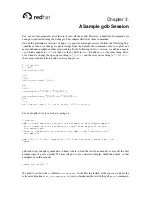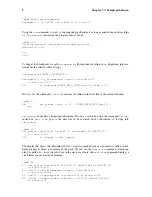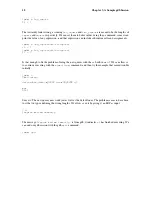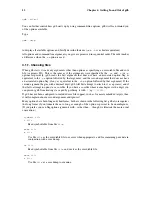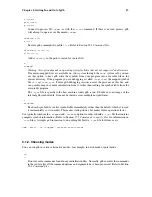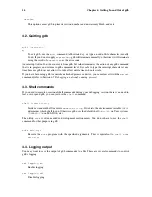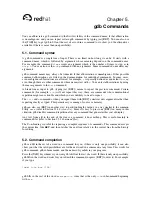
4
Chapter 2. Summary of gdb
That wasn’t the first time this sort of thing happened, and it was far from the last. Many times we
have heard a GNU user eagerly describe a manual that he is writing, his intended contribution to the
community, only to learn that he had ruined everything by signing a publication contract to make it
non-free.
Free documentation, like free software, is a matter of freedom, not price. The problem with the non-
free manual is not that publishers charge a price for printed copies--that in itself is fine. (The Free
Software Foundation sells printed copies of manuals, too.) The problem is the restrictions on the use
of the manual. Free manuals are available in source code form, and give you permission to copy and
modify. Non-free manuals do not allow this.
The criteria of freedom for a free manual are roughly the same as for free software. Redistribution
(including the normal kinds of commercial redistribution) must be permitted, so that the manual can
accompany every copy of the program, both on-line and on paper.
Permission for modification of the technical content is crucial too. When people modify the software,
adding or changing features, if they are conscientious they will change the manual too--so they can
provide accurate and clear documentation for the modified program. A manual that leaves you no
choice but to write a new manual to document a changed version of the program is not really available
to our community.
Some kinds of limits on the way modification is handled are acceptable. For example, requirements
to preserve the original author’s copyright notice, the distribution terms, or the list of authors, are ok.
It is also no problem to require modified versions to include notice that they were modified. Even
entire sections that may not be deleted or changed are acceptable, as long as they deal with nontech-
nical topics (like this one). These kinds of restrictions are acceptable because they don’t obstruct the
community’s normal use of the manual.
However, it must be possible to modify all the
technical
content of the manual, and then distribute the
result in all the usual media, through all the usual channels. Otherwise, the restrictions obstruct the
use of the manual, it is not free, and we need another manual to replace it.
Please spread the word about this issue. Our community continues to lose manuals to proprietary
publishing. If we spread the word that free software needs free reference manuals and free tutorials,
perhaps the next person who wants to contribute by writing documentation will realize, before it is
too late, that only free manuals contribute to the free software community.
If you are writing documentation, please insist on publishing it under the GNU Free Documentation
License or another free documentation license. Remember that this decision requires your approval--
you don’t have to let the publisher decide. Some commercial publishers will use a free license if you
insist, but they will not propose the option; it is up to you to raise the issue and say firmly that this is
what you want. If the publisher you are dealing with refuses, please try other publishers. If you’re not
sure whether a proposed license is free, write to mailto:licensing@@gnu.org.
You can encourage commercial publishers to sell more free, copylefted manuals and tutorials by
buying them, and particularly by buying copies from the publishers that paid for their writing or
for major improvements. Meanwhile, try to avoid buying non-free documentation at all. Check the
distribution terms of a manual before you buy it, and insist that whoever seeks your business must
respect your freedom. Check the history of the book, and try to reward the publishers that have paid
or pay the authors to work on it.
The Free Software Foundation maintains a list of free documentation published by other publishers,
at
http://www.fsf.org/doc/other-free-books.html
.
2.3. Contributors to gdb
Richard Stallman was the original author of gdb, and of many other gnu programs. Many others have
contributed to its development. This section attempts to credit major contributors. One of the virtues
of free software is that everyone is free to contribute to it; with regret, we cannot actually acknowledge
everyone here. The file
ChangeLog
in the gdb distribution approximates a blow-by-blow account.
Содержание ENTERPRISE LINUX 3 - SECURITY GUIDE
Страница 1: ...Red Hat Enterprise Linux 3 Debugging with gdb ...
Страница 12: ...2 Chapter 1 Debugging with gdb ...
Страница 28: ...18 Chapter 4 Getting In and Out of gdb ...
Страница 34: ...24 Chapter 5 gdb Commands ...
Страница 44: ...34 Chapter 6 Running Programs Under gdb ...
Страница 68: ...58 Chapter 8 Examining the Stack ...
Страница 98: ...88 Chapter 10 Examining Data ...
Страница 112: ...102 Chapter 12 Tracepoints ...
Страница 118: ...108 Chapter 13 Debugging Programs That Use Overlays ...
Страница 138: ...128 Chapter 14 Using gdb with Different Languages ...
Страница 144: ...134 Chapter 15 Examining the Symbol Table ...
Страница 170: ...160 Chapter 19 Debugging remote programs ...
Страница 198: ...188 Chapter 21 Controlling gdb ...
Страница 204: ...194 Chapter 22 Canned Sequences of Commands ...
Страница 206: ...196 Chapter 23 Command Interpreters ...
Страница 216: ...206 Chapter 25 Using gdb under gnu Emacs ...
Страница 296: ...286 Chapter 27 gdb Annotations ...
Страница 300: ...290 Chapter 28 Reporting Bugs in gdb ...
Страница 322: ...312 Chapter 30 Using History Interactively ...
Страница 362: ...352 Appendix D gdb Remote Serial Protocol ...
Страница 380: ...370 Appendix F GNU GENERAL PUBLIC LICENSE ...
Страница 386: ...376 Appendix G GNU Free Documentation License ...
Страница 410: ......

















